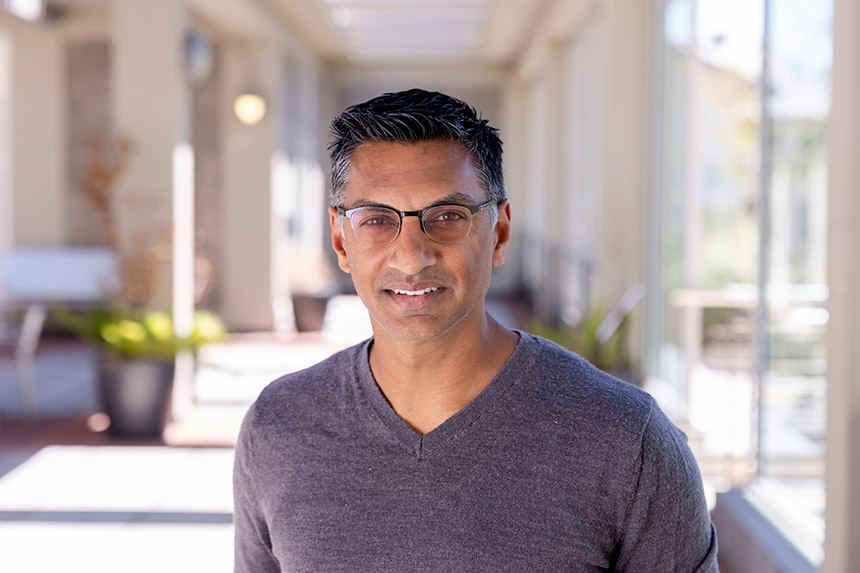
By Gwyneth K. Shaw
Professor Prasad Krishnamurthy was an economics graduate student when the 2008 financial crisis hit. The landmark Dodd-Frank Wall Street Reform and Consumer Protection Act — a sweeping overhaul of the financial regulatory system, aimed specifically at preventing another disaster — became law the same month he joined the Berkeley Law faculty in 2010.
Not surprisingly, much of his early-career research focused on what went wrong, including bank stability, financial regulation, the safety and soundness of banks, and the way the ’08 crash impacted broader markets.
“I was looking back and trying to understand what kinds of regulations would be appropriate responses,” Krishnamurthy says.
That focus turned out to be the perfect preparation for understanding two more recent shocks to the U.S. financial system: The COVID-19 pandemic and, to a lesser degree, the collapse earlier this year of a handful of regional banks, including Silicon Valley Bank.
Along the way, Krishnamurthy began working with Ted Mermin ’96, executive director of the school’s Berkeley Center for Consumer Law & Economic Justice, and discovered a passion for more public-oriented policy questions. He joined what has become a sizable group of scholars working on consumer issues, including Professors Abhay Aneja, Abbye Atkinson, Jonathan D. Glater, and Manisha Padi.
“I didn’t know I was a consumer law scholar until I started to interact with Ted,” Krishnamurthy says.
Rising recognition
As his perspective changed, the twin economic tremors have helped raise his public profile and influence — in California and nationally — through op-eds, media coverage, and service on two state commissions: the California Department of Financial Protection’s Debt Collection Advisory Committee and a California Law Revision Commission panel examining the state’s antitrust laws.
“It is gratifying to know that I can use my academic training and knowledge and contribute to public policy,” Krishnamurthy says. “It has also changed my research focus. I am now much more interested in the household and consumer-facing issues than in questions of systemic risk and how you design financial institutions for stability, issues that motivated the Dodd-Frank Act and tend to be the work of macroeconomists.
“Financial institution stability didn’t seem like that was the right niche for me, whereas the work I was doing with Ted on consumer debt was really inspiring and got me interested in doing more.”
Mermin says he and other consumer advocates used to call Krishnamurthy their secret weapon because his expertise and credentials were so effective in convincing legislators of all political stripes.
“Now that he’s served on the state’s inaugural debt collection commission and regularly produces op-eds in national publications, I think the secret may be out,” Mermin says. “Prasad has done a great deal of good for low-income people in this state and this country.”
A deep dive
When the pandemic hit, Krishnamurthy says, it was a huge test for the Dodd-Frank reforms. He and other banking scholars watched the early instability nervously, wondering whether the global health crisis would set off a parallel financial shock. The guardrails put into place after the 2008 crash really did help, he says, and it wasn’t until the past year when signs of instability in the banking sector began to appear.
“I had been thinking about these issues for a long time before this happened with Silicon Valley Bank and the other banks that have experienced trouble, and the particular ways they hit the rocks were of interest to me,” he says. “I felt like I could contribute to public conversation about and understanding of these issues.”
Krishnamurthy leaned into the topic, through his own writing, media interviews, and even a debate organized by the Brookings Institution and the University of Pennsylvania’s Wharton Initiative on Financial Policy and Regulation.
Silicon Valley Bank’s freefall had a spillover effect on the banking system that seemed outsized for the size and scope of the bank, he says, and raised a real issue about whether depositors should be insured above the current cap of $250,000.
“What I tried to articulate in some of my public writing was that we need to take this as a kind of canary in the coal mine moment — it shows us that our banking system is more vulnerable than we thought,” he says. “I think the important question for public policy is to ask what are the vulnerabilities that Silicon Valley Bank’s failure exposed? And what are the ways going forward that we can act prospectively to deal with them, as opposed to waiting until they are underway, when things are very hard to fix?”
One potential solution — and probably the most politically palatable — is to raise the insurance cap on small and medium-sized businesses, if not all depositors, Krishnamurthy says.
“These businesses often have millions in their deposit account, and they need to because that’s their cash management tool,” he says. “If Congress makes those changes, these businesses would know that in the event of a bank failure, they’ll be able to get the money that they’re relying on to make payroll and pay their suppliers and pay their creditors and carry out all their operations. I think that is an idea that can politically move forward would be a good step.”
Krishnamurthy’s next projects reflect his continuing evolution, including working papers on public banking and student loan forgiveness, bank mergers and wages, and a major research project on debt collection funded by a Pew Foundation Pew Charitable Trusts along with fellow economists Aneja and Padi.
Krishnamurthy is excited about what’s coming and grateful for the support of his colleagues and Dean Erwin Chemerinsky as he’s refined his place in the academic firmament.
“It’s been one of the real pleasures and privileges of working at Berkeley, to explore one’s own interests in this way,” he says.